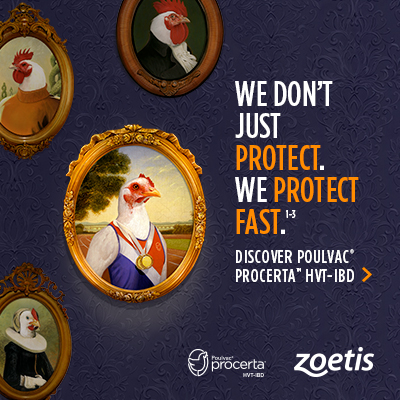Robust challenge studies demonstrate efficacy of new recombinant vector vaccine for IBDVs
A new recombinant vector vaccine provides early protection against variant, classic and very virulent infectious bursal disease viruses (IBDVs), robust challenge studies demonstrate.
“Poulvac® Procerta™ HVT-IBD provides an updated tool for protecting flocks against the strains of IBDV circulating among US broilers flocks, including the predominant AL2 variant,” said Angela Hartman, PhD, senior principal scientist at Zoetis and project team leader for development of the vaccine.
When challenged with the AL2 variant of IBDV at 14 days of age, Poulvac Procerta HVT-IBD provided 78% protection,1 she said.
AL2 now accounts for the majority of IBDV field isolates, according to a Zoetis survey. Of 139 isolates obtained from flocks representing all major broiler-production regions, 52% were AL2, an increase in prevalence from 46% found in a previous, similar survey.2
Poulvac Procerta HVT-IBD provided 96% protection against classic IBDV challenges on day 14 of age based on findings of acute gross bursal lesions,3,4 Hartman said.
The new vaccine also provided 90% protection after challenge with a very virulent IBDV (vvIBDV) on day 12 of age. Efficacy was based on mortality and histological bursal lesions 10 days after challenge,5 Hartman said.
She added that vvIBDV can lead to very high mortality,6 and although this type of IBDV is not a widespread problem in the US, it is a risk and has affected several commercial flocks in California.7
Leading disease challenge
IBDVs, which are highly contagious and immunosuppressive, remain a leading disease challenge for the poultry industry. “They tend to affect younger birds, and the younger the bird, the more severe the immunosuppression,” she explained. “Immunosuppression predisposes chicks to costly secondary infections, and that’s a greater concern now that most flocks are raised without antibiotics.”
As it is now, maternal antibodies that broilers get from immunized hens start to wane at about 14 days of age and sometimes sooner. The faster a recombinant HVT-IBD vaccine can initiate immunity, the less potential there is for profound immunosuppression, Hartman said.
Tested with and without maternal antibodies
In several of their studies with the new vaccine, Hartman and her team used specific-pathogen-free birds to mimic broilers with low or no maternal antibodies against IBDV, a situation that might occur in the field with inadequate breeder IBDV-vaccination programs, older breeders or higher field challenge, Hartman explained.
The Zoetis team also made sure the new vaccine was effective in the presence of high maternal IBDV antibodies. When they vaccinated birds either in ovo or subcutaneously with Poulvac Procerta HVT-IBD, the new vaccine provided 83% and 79% protection, respectively, when challenged with vvIBDV at 28 days of age despite maternal antibodies,8 she said.
 Duration of immunity
Duration of immunity
Although IBDVs tend to affect young broilers, the viruses can also cause immunosuppression in older birds, so IBDV vaccines need to protect flocks throughout their life, Hartman said.
In another study to evaluate the duration of immunity with Poulvac Procerta HVT-IBD, birds that received the new vaccine either in ovo or by subcutaneous injection on day of age were challenged with classic IBDV at 63 days of age. Based on mortality and bursal lesions, the results demonstrated the vaccine provided 100% protection.9
“Poulvac Procerta HVT-IBD will provide exceptional overall protection against IBDV in broilers and will be valuable to the egg-layer segment of the industry as well. The new vaccine should go a long way toward helping poultry producers prevent losses from IBDV,” Hartman said.
All trademarks are the property of Zoetis Services LLC or a related company or a licensor unless otherwise noted.
1 Data on file. Study Report No. B815RUS-19-B80. Zoetis LLC.
2 Cookson K, et al. A survey of wild type IBDV isolated from broiler flocks in the United States since 2014. 2020 International Poultry Scientific Forum, Atlanta, GA.
3 Data on file. Study Report No. B815WUS-19-A92. Zoetis LLC.
4 Data on file. Study Report No. B815RUS-19-B22. Zoetis LLC.
5 Data on file. Study Report No. B812RUS-19-B42. Zoetis LLC.
6 Dey S, Pathak D, Ramamurthy N, Maity HK, Chellappa MM. Infectious bursal disease virus in chickens: prevalence, impact, and management strategies. Vet Med: Res Rep. 2019;10:85-97.
7 California Update — very virulent infectious bursal disease virus (vvIBDV) in California. California Veterinarian. September/October 2012.
8 Data on file. Study Report No. B818RUS-19-B94. Zoetis LLC.
9 Data on file. Study Report No. B814RUS-19-B15. Zoetis LLC.
DISCOVERIES, Issue 12
Discoveries is a series of research news reports written by the editors of Poultry Health Today on behalf of the US Poultry Business of Zoetis.
BIO-00294
January 2021
Posted on January 21, 2021











